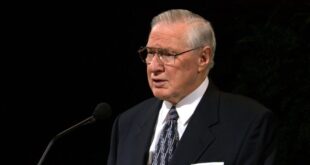On October 1, 1995, during the General Relief Society Meeting, President Gordon B. Hinckley delivered what would become one of the most significant declarations in modern Latter-day Saint history: “The Family: A Proclamation to the World.” This pivotal moment, which occurred amidst shifting cultural attitudes toward family and gender, established a clear doctrinal foundation that continues to guide families and influence Church teachings three decades later.
You can view his famous speech with his introduction and closing here, as well as the full transcript, at the end of this post.
Gordon B. Hinckley: A Prophet for Modern Times
When President Hinckley delivered the Family Proclamation, he was serving as the 15th President of The Church of Jesus Christ of Latter-day Saints, a position he held from 1995 to 2008. Known for his optimism, warmth, and ability to connect with people of all backgrounds, Hinckley led the Church through a period of unprecedented global growth and increased public visibility.
Born in 1910, Hinckley had witnessed remarkable historical changes throughout his life—from world wars to technological revolutions. His leadership style combined deep respect for tradition with forward-thinking adaptation. He embraced media opportunities, appearing on programs like “60 Minutes” and “Larry King Live,” and oversaw a dramatic acceleration in temple construction worldwide.
Hinckley’s prophetic foresight was evident in his ability to anticipate challenges facing families and society. The Family Proclamation, which he introduced just months into his presidency, demonstrated this prescient understanding of where cultural trends were heading and what doctrinal clarity would be needed in the decades to come.
The Context of the Proclamation
President Hinckley’s introduction of the Proclamation was deliberate and solemn. He prefaced the document by noting the “sophistry,” “deception,” and “allurement” prevalent in the world—elements that posed serious challenges to traditional family values. His words reflected awareness of cultural shifts already underway in 1995, including changing views on marriage, gender roles, and family structure.
The timing was significant. The Proclamation preceded by several years many of the major legal and social debates about marriage that would dominate the early 21st century. It came during the United Nations’ International Year of the Family, at a time when discussions about family definition were beginning to intensify globally. By issuing this declaration, the First Presidency and Quorum of the Twelve Apostles were not merely reacting to current events but providing prophetic guidance for forthcoming challenges.
President Hinckley’s characterization of the document as “a declaration and reaffirmation of standards, doctrines, and practices” emphasized that these teachings weren’t new—they represented consistent divine instruction “which the prophets, seers, and revelators of this church have repeatedly stated throughout its history.”
Core Principles of the Proclamation
The Family Proclamation articulates several foundational principles that have become central to Latter-day Saint theology and practice:
- The divine nature of marriage between a man and a woman
- The eternal significance of gender as “an essential characteristic of individual premortal, mortal, and eternal identity and purpose”
- The sacred responsibility of parents to nurture their children
- The complementary roles of fathers and mothers, with emphasis on equal partnership
- The warning that family disintegration brings serious consequences to society
Perhaps most significantly, the Proclamation places family relationships at the center of God’s plan, declaring that “the family is central to the Creator’s plan for the eternal destiny of His children.” This theological framework elevates family relationships beyond mere social constructs to divine institutions with eternal significance.
The Proclamation’s Enduring Impact
In the nearly three decades since its introduction, the Family Proclamation has become a cornerstone document for Latter-day Saints. Its influence extends across multiple domains:
Within the Church, the Proclamation serves as a foundational text for teaching about marriage, parenthood, and gender. It appears prominently in Church curriculum, inspires countless Relief Society and priesthood lessons, and hangs framed in countless Latter-day Saint homes worldwide.
In public discourse, the Proclamation has provided a clear articulation of the Church’s position on family issues during periods of significant social debate. When questions arise about the Church’s stance on marriage, gender, or parenthood, the Proclamation offers authoritative guidance.
For individual members, the Proclamation offers a roadmap for building successful families. President Hinckley’s emphasis that “happiness in family life is most likely to be achieved when founded upon the teachings of the Lord Jesus Christ” provides practical guidance through principles like “faith, prayer, repentance, forgiveness, respect, love, compassion, work, and wholesome recreational activities.
Relevance Today
The societal trends President Hinckley addressed in 1995 have only accelerated. Issues related to marriage definition, gender identity, and family structure remain at the center of cultural and legal debates worldwide. The Proclamation’s clear declarations on these matters continue to provide a fixed point of doctrinal clarity in shifting cultural landscapes.
For contemporary Latter-day Saints, the Proclamation offers both comfort and challenge. It affirms the eternal significance of family roles while acknowledging that “disability, death, or other circumstances may necessitate individual adaptation.” This balanced approach recognizes ideal patterns while allowing compassionate flexibility for real-world circumstances.
President Hinckley’s closing remarks to the Relief Society sisters—acknowledging them as “guardians of the hearth” and “bearers of the children”—reflected his deep appreciation for women’s essential contribution to family and society. His statement that “no other work reaches so close to divinity as does the nurturing of the sons and daughters of God” elevates parenting to a sacred calling.
Conclusion
When President Hinckley introduced the Family Proclamation in 1995, he could not have known exactly how prophectic it would prove to be—how dramatically cultural attitudes toward marriage, gender, and family would shift in the decades to follow. Yet the document he delivered has provided an unwavering reference point through rapidly changing times.
The Proclamation stands as one of President Hinckley’s most significant legacies—a clear, authoritative statement on family that continues to guide Church members while offering a consistent voice in broader societal conversations about family structure and purpose.
As President Hinckley stated in his concluding remarks, the strength of any nation “is rooted within the walls of its homes.” This fundamental truth, along with the doctrinal principles outlined in the Family Proclamation, continues to shape the lives of millions of Latter-day Saints worldwide, fulfilling President Hinckley’s vision of strengthening families “in conformity with these time-honored values.”
I’ve touched lightly on some of the serious problems which confront many of you sisters, with so much of sophistry that has passed off as truth, with so much of deception concerning standards and values, with so much of allurement and enticement to take on the slow stain of the world. We have felt to warn and forewarn.
In furtherance of this, we of the First Presidency and the Council of the Twelve Apostles now issue a proclamation to the Church and to the world as a declaration and reaffirmation of standards, doctrines, and practices relative to the family, which the prophets, seers, and revelators of this Church have repeatedly stated throughout its history.
I now take the opportunity of reading to you this proclamation:
We, the First Presidency and the Council of the Twelve Apostles of The Church of Jesus Christ of Latter-day Saints, solemnly proclaim that marriage between a man and a woman is ordained of God and that the family is central to the Creator’s plan for the eternal destiny of His children.
All human beings—male and female—are created in the image of God. Each is a beloved spirit son or daughter of heavenly parents, and as such, each has a divine nature and destiny.
Gender is an essential characteristic of individual premortal, mortal, and eternal identity and purpose.
In the premortal realm, spirit sons and daughters knew and worshiped God as their Eternal Father and accepted His plan by which His children could obtain a physical body and gain earthly experience to progress toward perfection and ultimately realize his or her divine destiny as an heir of eternal life.
The divine plan of happiness enables family relationships to be perpetuated beyond the grave. Sacred ordinances and covenants available in holy temples make it possible for individuals to return to the presence of God and for families to be united eternally.
The first commandment that God gave to Adam and Eve pertained to their potential for parenthood as husband and wife. We declare that God’s commandment for His children to multiply and replenish the earth remains in force.
We further declare that God has commanded that the sacred powers of procreation are to be employed only between man and woman lawfully wedded as husband and wife. We declare the means by which mortal life is created to be divinely appointed. We affirm the sanctity of life and of its importance in God’s eternal plan.
Husband and wife have a solemn responsibility to love and care for each other and for their children. Children are an heritage of the Lord. Parents have a sacred duty to rear their children in love and righteousness, to provide for their physical and spiritual needs, to teach them to love and serve one another, to observe the commandments of God, and to be law-abiding citizens wherever they live.
Husbands and wives—mothers and fathers—will be held accountable before God for the discharge of these obligations.
The family is ordained of God. Marriage between man and woman is essential to His eternal plan. Children are entitled to birth within the bonds of matrimony and to be reared by a father and a mother who honor marital vows with complete fidelity.
Happiness in family life is most likely to be achieved when founded upon the teachings of the Lord Jesus Christ. Successful marriages and families are established and maintained on principles of faith, prayer, repentance, forgiveness, respect, love, compassion, work, and wholesome recreational activities.
By divine design, fathers are to preside over their families in love and righteousness and are responsible to provide the necessities of life and protection for their families. Mothers are primarily responsible for the nurture of their children. In these sacred responsibilities, fathers and mothers are obligated to help one another as equal partners.
Disability, death, or other circumstances may necessitate individual adaptation. Extended families should lend support when needed.
We warn that individuals who violate covenants of chastity, who abuse spouse or offspring, or who fail to fulfill family responsibilities will one day stand accountable before God.
Further, we warn that the disintegration of the family will bring upon individuals, communities, and nations the calamities foretold by ancient and modern prophets.
We call upon responsible citizens and officers of government everywhere to promote those measures designed to maintain and strengthen the family as the fundamental unit of society.”
(Close of statement.)
We commend to all a careful, thoughtful, and prayerful reading of this proclamation.
The strength of any nation is rooted within the walls of its homes. We urge our people everywhere to strengthen their families in conformity with these time-honored values.
May the Lord bless you, my beloved sisters. You are the guardians of the hearth. You are the bearers of the children. You are they who nurture them and establish within them the habits of their lives. No other work reaches so close to divinity as does the nurturing of the sons and daughters of God.
May you be strengthened for the challenges of the day. May you be endowed with wisdom beyond your own in dealing with the problems you constantly face. May your prayers and your pleadings be answered with blessings upon your heads and upon the heads of your loved ones.
We leave with you our love and our blessing that your lives may be filled with peace and gladness. It can be so. Many of you can testify that it has been so.
The Lord bless you now and through the years to come, I humbly pray in the name of our Savior, the Lord Jesus Christ. Amen.




